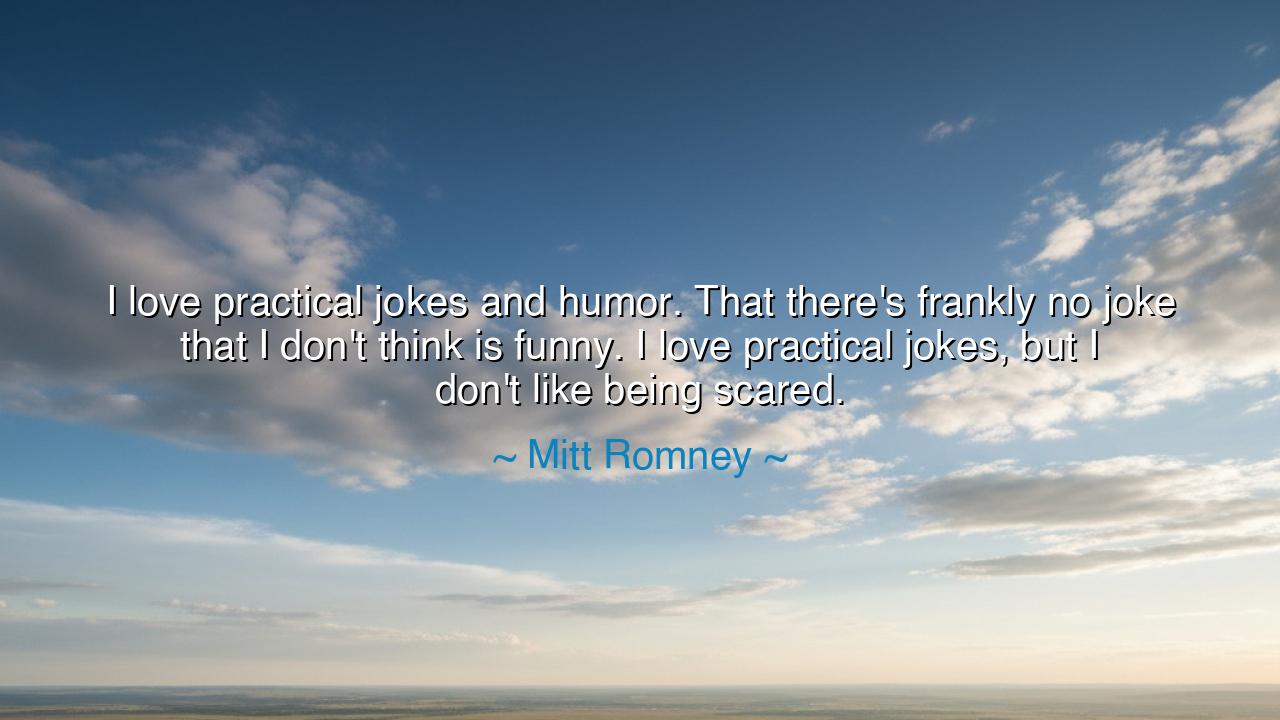
I love practical jokes and humor. That there's frankly no joke
I love practical jokes and humor. That there's frankly no joke that I don't think is funny. I love practical jokes, but I don't like being scared.






“I love practical jokes and humor. That there’s frankly no joke that I don’t think is funny. I love practical jokes, but I don’t like being scared.” — so spoke Mitt Romney, a man known for public duty yet here revealing the playful pulse of his humanity. Though simple in sound, these words carry an undercurrent of deep and universal truth — the tension between laughter and fear, between the delight of humor and the vulnerability of the heart. For within every jest, there is both joy and risk: the joy of shared laughter, and the risk of discomfort or pain. Romney’s reflection is not only personal but philosophical, reminding us that humor, though born of lightness, touches the most tender parts of the human spirit.
In this saying, Romney celebrates humor as a force of unity and renewal. To laugh is to be human; it is to let go of pride, to dissolve the walls that divide us. The ancients themselves honored laughter as sacred — the philosopher Democritus was called “the laughing sage,” for he saw that joy was wisdom’s companion. Humor teaches humility; it reminds even the powerful that life is too fragile and strange to be taken with deadly seriousness. When Romney says there is “no joke that I don’t think is funny,” we hear in it not mere amusement, but an embrace of the world’s imperfection — a heart willing to find light even in folly.
And yet, in the same breath, he confesses, “I don’t like being scared.” This is not contradiction, but revelation. He distinguishes between humor that uplifts and laughter that wounds. True humor, like true friendship, builds connection; but fear — the kind born of cruelty, humiliation, or malice — breaks it. To enjoy the jest is to share in laughter freely given; to be frightened or mocked is to feel one’s dignity stripped away. Here lies the delicate balance of human playfulness: the boundary between laughter as healing and laughter as harm. Romney’s words invite us to recognize that distinction — to love humor, but not at the expense of the heart.
In ancient times, Aristotle wrote that laughter was the gift that set humanity apart — a spark of divine intelligence that allowed us to see life’s absurdities without despairing. But he also warned of excess — of mockery that shames, of jesting that scorns. The wise, he said, know how to laugh with others, not at them. We see this wisdom echoed in Romney’s sentiment: that joy should never arise from another’s fear. Practical jokes, when born from affection and good spirit, draw people closer — they remind us not to take ourselves too seriously. But when they aim to frighten or humiliate, they corrupt the very laughter they seek to inspire.
Consider the tale of Mark Twain, that master of humor whose words danced between wit and truth. Twain loved mischief and laughter — he could turn even tragedy into mirth — yet he despised cruelty masquerading as humor. Once, when a prank caused genuine distress to a friend, Twain was said to have wept with regret. “The human race has only one effective weapon,” he wrote later, “and that is laughter.” But he knew that weapon must be wielded gently, for it could both heal and hurt. So too does Romney’s reflection carry that same wisdom: to delight in humor, but to reject the kind that frightens or wounds.
The meaning, then, is clear — laughter is sacred when it connects souls, profane when it divides them. Humor is the mirror of the heart; it reveals whether one’s joy is kind or cruel. To love laughter but not fear is to choose joy over domination, connection over control. It is to understand that while humor frees us, fear enslaves. In our own lives, this means learning to laugh with generosity — to be the kind of person whose humor lifts others rather than darkens their spirit.
Let this, then, be the lesson: cultivate humor that heals. Laugh often, and laugh kindly. Share jokes that unite, not frighten; bring levity to heavy hearts, not fear to gentle souls. Learn to see life through the eyes of both the jester and the sage — to balance joy with empathy, and mischief with compassion. And when others stumble or fear, let your laughter be the hand that lifts, not the echo that mocks.
Thus spoke Mitt Romney, and through his words we hear an ancient wisdom dressed in modern speech: to love humor is to love humanity itself — for laughter is the music of the soul. But to shun fear is to protect the sanctity of that music, ensuring that it remains pure, shared, and kind. And so, may our laughter never be the sound of someone else’s fear, but the song of friendship echoing through the heart of the world.






AAdministratorAdministrator
Welcome, honored guests. Please leave a comment, we will respond soon